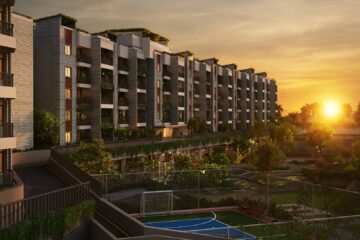Real estate investments can yield high returns over time, but they require a significant amount of capital. Therefore, prospective home buyers should determine the fair value of a property before investing in it. With a proper assessment, real estate investments have the potential for significant appreciation. The value of an apartment will depend on a number of factors, including its location, size, amenities, and overall market condition. In this blog, we will discuss some of the key factors that can affect the valuation of an apartment in India:
- Location: The location of an apartment is one of the most important factors affecting its valuation. Within a city, the value of apartments can vary significantly depending on their proximity to key locations such as city centers, hospitals, schools, airports, railway stations, highways, entertainment and business hubs. In addition, factors such as ease of access, availability of public transportation, and the quality of surrounding infrastructure can also impact apartment valuation.
- Amenities: Amenities available in an apartment complex can also impact its valuation. Apartments with amenities such as swimming pools, parking, gyms, parks, and playgrounds are generally valued higher than those without. In addition, the quality of the amenities can also impact the valuation. For instance, a high-end gym with state-of-the-art equipment is likely to increase the value of an apartment more than a basic gym with older equipment. Apartments with security features such as CCTV cameras, security guards, and access control systems are generally valued higher than those without.
- Builder’s reputation: The reputation of the apartment building and the builder can also impact its valuation. Buildings with a good reputation for quality construction, maintenance, and management are generally valued higher than those with a poor reputation. This is because buyers and renters are willing to pay more for the peace of mind that comes with a well-maintained and well-managed building. Nandi Housing, for instance, has a solid reputation of being one the oldest real estate developers in Bengaluru with a 42-year legacy of building quality homes.
- Floor level: The floor level of an apartment can also impact its valuation. In general, apartments located on higher floors are valued higher than those on lower floors. This is because higher floors often offer better views and more privacy, which are desirable features for many buyers and renters.
- Apartment size: The size of an apartment is another important factor affecting its valuation. Larger apartments are generally valued higher than smaller ones, although this can vary depending on the location and other factors. In general, apartments with more bedrooms and bathrooms are valued higher than those with fewer.
- Structure: The value of a property is influenced by its layout and design, as well as its durability and life cycle. Additionally, the cost and quality of materials used during construction, physical attributes like roof covering, height, and type of foundation, as well as waterproofing and plinth level, also play a crucial role in determining the value of a property.
- Neighbourhood: The location of a property in a highly desirable, central neighborhood often results in it being priced at a premium. This, combined with the availability of nearby amenities, plays a crucial role in determining its overall value.The overall character and reputation of the neighborhood or community in which a property is located can also affect its valuation.
- Legal and regulatory compliance: Properties that are legally compliant and meet all regulatory requirements are generally more valuable than those that do not.
- Age and condition: The age and overall condition of an apartment can also impact its valuation. Older apartments are generally valued lower than newer ones, although this can vary depending on the location and other factors. Similarly, apartments that are well-maintained and in good condition are valued higher than those that are in need of repairs.
- Property market: The value of a property can be influenced by the condition of the property market at both the local and national levels. Various factors such as the quantity of properties available for sale, the level of demand from prospective buyers, and the typical selling price of similar homes can have an impact on its worth. Additionally, economic indicators such as interest rates, inflation, and other expenses that affect consumers can also play a role.


